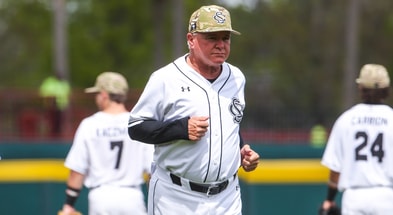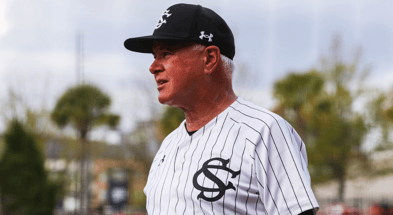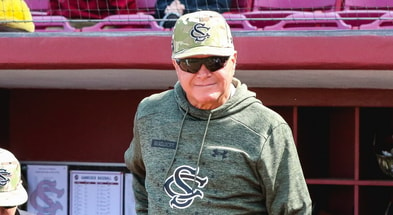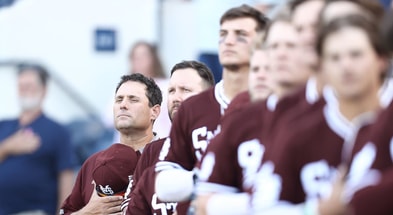Paul Mainieri's stance on analytics vs. baseball instinct and how he will manage at South Carolina

Outside of the countless wins over his career and trips to Omaha, there’s a definite elephant in the room. South Carolina’s new head baseball coach Paul Mainieri has been out of the game for three years.
So it’s easy to ponder about how he will do in his return to baseball, especially with the way the game continues to change.
One of the mainstays in baseball over the last few years has been analytics. Teams at all levels are looking more at statistics and different numbers to win games. It’s a different game than what Mainieri was used to during majority of his coaching career.
Just like anything in life, though, Mainieri knows he will have to try and adjust with the times. Otherwise, he’ll get left behind.
“The analytics can be very valuable,” Mainieri said. “Monte (Lee) took me for a tour of the hitting facility (on Thursday) and showed me all the computers and all this stuff that we can do. Why would you not take advantage of it?
“When I talked to Terry (Rooney) about his evolving as a pitching coach, he explained to me how important some of the analytics are to him and how he’s going to work with the pitchers. So yeah, it’s crazy not to use what technology can give you and the advances that we have in the game.”
[GamecockCentral for $1: In-depth coverage and a great community]
But in the same breath, Mainieri has been coaching for nearly 40 years. When he coaches his first game at South Carolina next February, it will mark his 40th season as a skipper in college baseball. He’s seen a lot of baseball and knows what he’s doing.
So while he will plan to use analytics, he’s also going to trust his feelings and best judgement. After all, it’s not like he accidentally fell into becoming a national championship-winning head coach.
Top 10
- 1Breaking
Isaiah Augustave
CU RB not with program
- 2New
Mike Elko
Shreds player over motto
- 3
Jarin Stevenson
Alabama forward to transfer
- 4
Federal Bill to replace NCAA
Conference shakeup, limitless transfers
- 5Hot
JT Toppin
$4M NIL package
Get the On3 Top 10 to your inbox every morning
By clicking "Subscribe to Newsletter", I agree to On3's Privacy Notice, Terms, and use of my personal information described therein.
“I’m going to trust these two little white things in the front of my face. I’m going to see what I see. And I’m going to believe what I see,” Mainieri said. “I’ve been a pretty good judge of talent. That allowed me to last for 39 years without somebody kicking me to the curb.”
Ultimately, it will come down to player performance, he said. He also plays a role in everything with putting the players in spots to be successful. And with that, he knows he will have to do a good job of identifying talent, which is a bigger deal now with the way recruiting has also changed.
“I’ve always said this: the players you choose to tie and hitch your wagon are going to determine whether or not you’re a good coach,” Mainieri said. “I have never, in 39 years as a head coach, pitched one ball or hit one pitch or run the bases or caught it. It’s all about the players. They’re the ones that get it done or don’t get it done. So I have to make the judgement on who are the players that we can really trust, especially in pressure situations.”
[On3 App: Get South Carolina push notifications from GamecockCentral]
Mainieri’s layman terms version of player evaluation is pretty simple. For him, runs batted in is the most important stat and it’s one that he looks at frequently. Analytics might not necessarily agree with that statement, but you have to be able to score to win games.
“It doesn’t do any good to get on base if you don’t get those base runners around to home plate. The whole idea is to score runs. And the run differential is what matters. Look, does the spin rate help a pitcher be more successful? Absolutely. Okay, but the idea is to get the hitter out and limit the amount of runs that we give up. So yeah, it’s going to be a combination,” Mainieri said.
“I’m not going to be a dinosaur and say, ‘Oh no, I don’t care about all that other stuff.’ It’d be silly for me to do that. And the players have grown up with that. They’ve started at ages 10-11 learning about all those kinds of things. We’re not going to just completely divorce ourselves from it. But if it came down to the bottom line of do you play a person with good exit velocity or a guy that comes through in the clutch with runner on third base and one out? I’m going to play the guy that gets the runner in.”
























